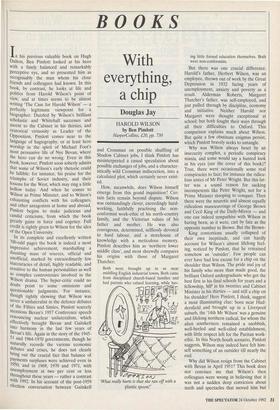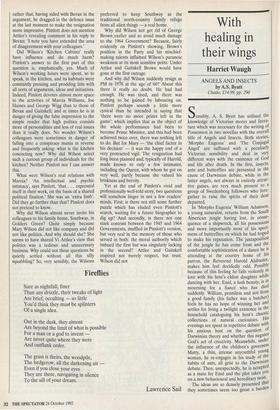BOOKS
With everything, a chip
Douglas Jay
HAROLD WILSON by Ben Pimlott HarperCollins, £20, pp. 730 In his previous valuable book on Hugh Dalton, Ben Pimlott looked at his hero With a finely balanced and remarkably Perceptive eye, and so presented him as recognisably the man whom his close friends and colleagues had known. In this book, by contrast, he looks at life and Politics from Harold Wilson's point of view, and at times seems to be almost writing 'The Case for Harold Wilson' — a Perfectly legitimate viewpoint for a biographer. Dazzled by Wilson's brilliant scholastic and Whitehall successes and ascent to the Cabinet in his thirties, and Oratorical virtuosity as Leader of the Opposition, Pimlott comes near to the language of hagiography, or at least hero worship in the spirit of Michael Foot's most persuasive life of Nye Bevan, where the hero can do no wrong. Even in this book, however, Pimlott soon soberly admits that some of Wilson's early rhetoric could be fallible: for instance, his praise for the triumphs of Soviet industry, and their lessons for the West, which may ring a little hollow today. And when he comes to Wilson as Prime Minister, and to Wilson's exhausting conflicts with his colleagues, and other antagonists at home and abroad, Pimlott begins to make judicious and candid criticisms, from which the book greatly gains in force and cogency. Full credit is rightly given to Wilson for the idea of the Open University. In its complete and excellently written 700-odd pages the book is indeed a most impressive achievement, marshalling a daunting mass of sources, official and imofficial, marked by extraordinarily few inaccuracies of detail, highly readable, and sensitive to the human personalities as well as complex controversies involved in the Wilson drama. The hyper-critic could no doubt point to some omissions and questionable judgments. For instance, though rightly showing that Wilson was never a unilateralist in the defence debates of the Fifties and Sixties, Pimlott scarcely mentions Bevan's 1957 Conference speech renouncing nuclear unilateralism, which e. ffectively brought Bevan and Gaitskell into harmony in the last few years of Bevan's life. Again in the story of the 1945- 51 and 1964-1970 governments, though he naturally records the various economic debates and crises, he does not clearly bring out the crucial fact that balance of Payments surpluses were achieved even in 1950, and in 1969, 1970 and 1971, with unemployment at two per cent or less throughout these years — rather a contrast with 1992. In his account of the post-1959 election conversation between Gaitskell
and Crossman on possible shuffling of Shadow Cabinet jobs, I think Pimlott has misinterpreted a casual speculation about possible exchanges of jobs, and a character- istically wild Crossman indiscretion, into a calculated plot, which certainly never exist- ed.
How, meanwhile, does Wilson himself emerge from this grand inquisition? Cer- tain facts remain beyond dispute. Wilson was outstandingly clever, exceedingly hard- working, faithfully practising the non- conformist work-ethic of his north-country family, and the Victorian values of his father and mother. He was also courageous, determined, selflessly devoted to hard labour, and a storehouse of knowledge with a meticulous memory. Pimlott describes him as 'northern lower middle class', and most shrewdly compares his origins with those of Margaret Thatcher:
Both were brought up in or near middling English industrial towns. Both came from disciplined church-based families and had parents who valued learning, while hav-
'What really hurts is that she ran off with a plastic spoon!'
ing little formal education themselves. Both were non-conformists.
But there was one crucial difference. Harold's father, Herbert Wilson, was an employee, thrown out of work by the Great Depression in 1932 facing years of unemployment, anxiety and poverty as a result. Alderman Roberts, Margaret Thatcher's father, was self-employed, and just pulled through by discipline, economy and initiative. Neither Harold nor Margaret were thought exceptional at school; but both fought their ways through all their difficulties to Oxford. This comparison explains much about Wilson. But quite a few obstinate enigmas persist, which Pimlott bravely seeks to untangle.
Why was Wilson always beset by an insecurity complex, a periodic conspiracy mania, and some would say a hunted look in his eyes (see the cover of this book)? True, there were occasionally some real conspiracies to face; for instance the ridicu- lous antics of Mr Peter Wright. But this lat- ter was a sound reason for sacking incompetents like Peter Wright, not for a Prime Minister stooping to conquer. Then there were the neurotic and almost equally ridiculous manoeuvrings of George Brown and Cecil King of the Daily-Mirror — and one can indeed sympathise with Wilson in having been, as it were, cast by fate as the opposite number to Brown. But the Brown- King contortions usually collapsed of their own ineptitude, and can hardly account for Wilson's almost lifelong feel- ing, noticed by Pimlott, that he remained somehow an 'outsider'. Few people can ever have had less excuse for a chip on the shoulder than Wilson. The pride and joy of his family who more than made good, the brilliant Oxford undergraduate who got the best first in his final schools for years and a fellowship, MP in his twenties and Cabinet Minister in his thirties — and still a chip on his shoulder! Here Pimlott, I think, suggest a most illuminating clue: born near Hud- dersfield and brought up in a Liverpool suburb, the '14th Mr Wilson' was a genuine and lifelong northern radical, for whom the alien southerners remained a snobbish, well-heeled and well-oiled establishment, with little respect left for the Puritan work- ethic. In this North-South scenario, Pimlott suggests, Wilson may indeed have felt him- self something of an outsider till nearly the end.
Why did Wilson resign from the Cabinet with Bevan in April 1951? This book does not convince me that Wilson's then colleagues were wrong in believing that it was not a sudden deep conviction about teeth and spectacles that moved him but rather that, having sided with Bevan in the argument, he dragged in the defence issue at the last moment to make the resignation more impressive. Pimlott does not mention Attlee's revealing comment in his reply to Bevan: 'I note you have extended the area of disagreement with your colleagues.'
Did Wilson's 'Kitchen Cabinet' really have influence and do much harm? Pimlott's answer to the first part of this question is, emphatically, yes. Much of Wilson's working hours were spent, so to speak, in the kitchen, and its habitués were constantly pressing and prodding him with all sorts of arguments, ideas and initiatives. Indeed, Pimlott devotes almost more space to the activities of Marcia Williams, Joe Haines and George Wigg than to those of Bevan and Gaitskell; and at times he is in danger of giving the false impression to the simple reader that high politics consists more of personalities and less of real issues than it really does. No wonder Wilson's colleagues were sometimes in danger of falling into a conspiracy mania in reverse and frequently asking: what is the kitchen concocting now? Why did Wilson select such a curious group of individuals for the kitchen? Neither Pimlott nor I can answer this.
What were Wilson's real relations with Marcia? 'An intellectual and psychic intimacy', says Pimlott, 'that. . . expressed itself in their work, on the basis of a shared political fixation.' She was an 'extra limb'. Did they go further than that? Pimlott does not pretend to know.
Why did Wilson almost never invite his colleagues to his family home, Southway, in Golders Green? Quite simply because Mary Wilson did not like company and did not like politics. And why should she? She seems to have shared Vi Attlee's view that politics was a tedious and unnecessary business. Why could not these questions be quietly settled without all this silly squabbling? So, very sensibly, the Wilsons preferred to keep Southway as the traditional north-country family refuge from all alien things — a real home.
Why did Wilson not get rid of George Brown earlier and so avoid much damage to the 1964 Government? Because, fairly evidently on Pimlott's showing, Brown's position in the Party and his mischief- making talents inflamed Wilson's paranoic weakness at its most sensitive point. Under Attlee and Gaitskell Brown would have gone at the first outrage.
And why did Wilson suddenly resign as PM in 1976 at the age of 60? About this there is really no doubt. He had had enough. He was tired, and there was nothing to be gained by labouring on. Pimlott perhaps sounds a little more cynical than he intended in saying that 'there were no more prizes left in the game'; which implies that as the object of the whole performance had been to become Prime Minister, and this had been achieved twice over, there was nothing left to do. But for Mary — 'the chief factor in his decision' — it was the happy end of a very protracted vigil. The resignation had long been planned and, typically of Harold, made known to only a few intimates, including the Queen, with whom he got on very well, partly because she valued his briskness and brevity.
Yet at the end of Pimlott's vivid and professionally well-told story, two questions will somehow linger in not a few readers' minds. First, is there not still some further puzzle which has eluded even Pimlott's search, waiting for a future biographer to dig up? And secondly, is there not one stark contrast between the 1945 and 1964 Governments, muffled in Pimlott's version, but very real in the memory of those who served in both: the moral authority which imbued the first but was singularly lacking in the second? Attlee and Gaitskell inspired not merely respect, but trust. Wilson did not
Lawrence Sail
Fireflies
Sure as nightfall, finer Than any drizzle, their tweaks of light Are brief, occulting — so little You'd think they must be splinters Of a single idea.
Out in the dusk, they almost Are beyond the limit of what is possible For a man or a god to invent — Are never quite where they were And outflank order.
The grass is theirs, the woodpile, The hedgerow, all the darkening air — Even if you close your eyes They are there, navigating in silence To the sill of your dream.



































































 Previous page
Previous page